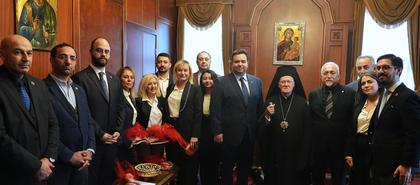LAWS & REGULATIONS
Company Establishment
Corporations established by foreign joint venture partners with or without a Turkish partner are treated as Turkish corporations and are entitled to all rights pertaining to Turkish firms under the Turkish Commercial Code. The law does not put any restriction on the type of enterprise that will be established by foreigners. The first step in establishing a business in Turkey is to fill out the business registration form at the local trade registry office located at the local chamber of commerce.
The process is as follows:
• Submit the notarized articles of association.
• Deposit 0.04% of the capital into either a state bank or the Central Bank of the Republic of Turkey.
• Complete the company establishment form and register with the trade registry office.
International companies may start their activities in Turkey in various forms depending on the investors' development strategies. The most common types of legal entities in Turkey are:
• Limited Liability Company (Ltd. Sit.)
• Joint-stock company (A.S.)
• Branch office
• Liaison office
Limited Liability Company (Ltd. Sit)
Limited liability companies may be composed of real persons or legal entities and must consist of at least two and no more than fifty partners. The overall share of capital must be a minimum of 5.000 YTL. All partners are personally liable for the debts of the company up to the whole amount of their capital contribution, however, partners are not held liable for the unpaid portions of others’ contributions. The partners are also directly exposed to the tax liabilities of the company, limited however to their own shares. Shares of a limited company can only be transferred to third parties with the consent of other partners.
According to the current Turkish Commercial Code, banks, private finance institutions, insurance companies, financial leasing companies, factoring companies, holding companies, companies operating as foreign currency exchange offices, companies dealing with public warehousing, publicly held companies subject to the Capital Markets Law, companies that are founders and operators of free zones should be established as Joint Stock Companies and these companies are still subject to permit from Ministry of Industry and Trade for their foundations.
Joint - Stock Company (A.S.)
Minimum of 5 shareholders, who may be either real or legal entities, can establish a joint-stock company. Capital Market Board regulations apply to this type of companies, whose shareholders’ number is at least 250, or to those which have issued securities. The minimum capital requirement for establishing a joint-company is 50.000 YTL. Joint-Stock companies are also subject to regulation by the Turkish Commercial Code. However, the law permits significant flexibility in drafting the articles of the association. General Assembly, Board of Directors, Auditors and Executives are the four administrative components of a joint—stock company. The General Assembly consisting of shareholders has the entire control over the company, whereas Board of Directors is the executive board of a joint-stock company. The board members do not have to be Turkish citizens or resident in Turkey, but each must hold qualification shares with a minimum total nominal value of 5.000 YTL. The board of directors represents the company in its dealings with third parties and is responsible for all aspects of managing the business. Auditors check the accounts and transactions related with joint-stock company. The number of auditors can not be more than five and the majority of them must be Turkish citizens.
Branch office:Foreign companies may also operate through branches providing that they are established in accordance with relevant legislation. The income of a branch derived in Turkey is taxed in the same way as resident corporations. There is no special reporting and audit requirement imposed on branches of foreign companies, they are subject to the same regulations with resident companies. The officials of the Undersecretariat of Treasury and Istanbul Tax Administration Office, whom I have contacted, comment that there is no practical advantage of establishing a branch instead of a corporation. For establishing a branch in Turkey, a permit from the Undersecretariat of Treasury Foreign Investment Department (FID) must be obtained before the registration to the Commercial Registry Office. Alternatively, foreign companies can also establish liaison offices in Turkey via a permit from FID and these liaison offices can only be involved with non-commercial activities in Turkey.
Liaison office:
Countries established in accordance with laws of foreign countries can open liaison offices in Turkey provided that those offices do not carry out any commercial activities in Turkey. So as to open a liaison office in Turkey, the relevant company has to apply to the Directorate General of Foreign Investments of the Undersecretariat of Treasury. Applications for establishment and extension are to be finalized within 5 days following the application provided that the necessary documents are complete and proper. Applicants of foreign companies to establish liaison offices so as to operate in sectors subject to special legislation such as money and capital markets, insurance, etc. are assessed by the relevant regulatory and supervisory authorities. After an establishment permit is granted by the Directorate General of Foreign Investments, the relevant Liaison office is supposed to register to the local tax office and to send a copy of the tax office registration document to the Directorate General latest within 1 month. Liaison offices are granted operation permits for 3 months at most.
For extensions, successive extensions of maximum 3 years each may be granted betaking into consideration the activities of previous years and plans and objectives for the future.
Foreign Direct Investment Law
Law No: 4875
Date of Passage: 5 June 2003
Date and Official Gazette: 17 June, 2003
In order to establish a new corporation, both nationals and non-nationals of Turkey need to apply to the Commercial Registry Office (Ticaret Sicil Memurlugu) of the city, where they would like to start their commercial and industrial activities. It takes one or two days to register a new firm on average. For their application, the establishing partners should present three copies of the starting company’s main contract, their certificates of birth if they are nationals, otherwise their passports and a copy of their passports’ first page, which must be endorsed by the civil notary. Two other documents, a letter of commitment (taahhutname) and an attestation (tasdikname) are supplemented by the Commercial Registry Office at the time of application. Following their application to the commercial registry office, tax administration office (vergi dairesi) assigns a tax number to the company within ten days. On the other hand, individuals also need a tax number for all kinds of commercial and banking transactions, regardless of their nationality. Partners and directors of firms definitely need a tax number if they want to do business in Turkey. Foreign nationals need to apply to the tax administration offices with their passports in order to obtain a tax number.
Please note that a number of other licenses/permits need to be received from various ministries, after the trade registration is completed. These are namely,
- Environmental Impact Assessment Report (Cevre Etki Degerlendirme Raporu) from the Ministry of Environment - Non-healthy Firm License (Gayri-Sihhi Muessese Ruhsati) from the Ministry of Health
- Employee & Employer Safety Control Certificate (Is ve Isci Guvenligi Ruhsati) from the Ministry of Labor (also the Ministry of Health is involved in this procedure)
- If there are line ministries involved, then operations license from the involving ministry (i.e.: for hotel business from the Ministry of Tourism, for energy from the Ministry of Energy)
A 3 months or a 6 months term is officially given for the issuance of each above-mentioned document.
For detailed instructions in English on how to establish a company, please refer to Istanbul Chamber of Commerce website, www.ito.org.tr.
An investment promotion agency under the prime ministry was established very recently. The main duties of the investment promotion agency include formulation and implementation of national strategy on promoting international investments in Turkey, coordinating related activities with other institutions, informing potential international investors about general investment climate and incentives available, giving support in obtaining required licenses and permits, assisting international investors when they are confronted with obstacles and problems and public relations regarding international investment in Turkey. Although the agency is aiming to operate under ‘one stop shop’ principle, other institutions related to foreign direct investment issues will continue their work.
Taxes:
Corporate tax rate is currently at 20%. Aside from corporate tax, when dividends are paid out, the company is required to make a withholding from the dividends under the Turkish Tax Legislation. The rate of withholding tax is 15%. However, dividends paid to a resident corporation or a branch office established in Turkey is not subject to the withholding tax at source.
Value added tax is in general (for a large part of the goods) 18%, in others 1% or 8%. The generally applied VAT rate varies between 1%, 8%, and 18%. Commercial, industrial, agricultural, and independent professional goods and services, goods and services imported into the country, and deliveries of goods and services caused by other activities are all subject to VAT. Special consumption tax on many goods range between 20 to 30 percent, there are also proportionate rates for certain goods (i.e.: fuel). There are four main product groups that are subject to special consumption tax at different tax rates:
• Petroleum products, natural gas, lubricating oil, solvents, and derivatives of solvents
• Automobiles and other vehicles, motorcycles, planes, helicopters, yachts
• Tobacco and tobacco products, alcoholic beverages
• Luxury products Unlike VAT, which is applied on each delivery, special consumption tax is charged only once.
Transfer of Profits:
According to the Foreign Direct Investment Law numbered 4875, which was ratified and put in effect on June 17, 2003, Article 3, Item c:
“Foreign Investors can freely transfer profits abroad: profits, dividends, proceeds from the sale or liquidation of all or any part of an investment, compensation payments, amounts arising license, management and similar agreements, and reimbursements and interest payments arising from foreign banks or special financial institutions.”
Investment Encouragement System:
The Undersecretariat of Treasury issues encouragement certificates to new investments. The minimum amount of investments for obtaining investment encouragement certificates is YTL 200.000 for small and medium sized enterprises and YTL 1.000.000 for larger companies. Incentives granted in investment encouragement certificate system are,
- 100 % customs duty and VAT exemption on imported machinery and equipment
- Interest rate reductions on loans; 5 points and 2 points for YTL and foreign currency denominated investment loans from banks, respectively.
New businesses established in less developed 39 provinces are granted tax incentives given that they generate new employment for at least 10 people. Such investments are held exempt from withholding tax and employer’s social security contribution up to 100%. Provision of land as well as 20% relief on electricity costs for certain sectors in least developed regions is another incentive program of the treasury
Free trade zones (FTZ) are outside customs territory and hence, neither tariffs nor duties apply to goods that are imported into FTZ. Companies registered at FTZs can stock their goods for unlimited period of time at FTZ. Manufacturing companies operating in FTZs enjoy exemption from corporate tax until Turkey becomes an EU-member. Sales from FTZ to the domestic market are permitted. FTZs provide infrastructure, open and covered warehousing and ready-to-use factory sites to investors. Legal and administrative regulations in commercial, financial and economic fields that are applicable within the customs area are either not implemented or partially implemented in the free zones. There are 20 free zones in Turkey operating close to the EU and Middle East markets adjacent to major Turkish ports on the Mediterranean, Aegean and Black Seas, with easy access to international trade routes.
Moreover, they also offer utility services such as electricity, water, telecom and waste management.
Technology development zones (TDZ) is a recent initiative for stimulating technology intensive investments, software development and private sector-university cooperation. Hence, most TDZs are located either inside or in the vicinity of university campuses. There are 30 TDZs of which 18 are operational, whereas 12 have been approved and are currently under construction. Ankara has six TDZs, Istanbul has three, Kocaeli has three, and other provinces listed in the pop-up table have one each. TDZs provide corporate and income tax exemption for R&D and software development activities to registered companies until 31.12.2013. Registered companies are also exempt from value added tax for the procurement of system management, data management, business applications, internet, mobile and defense technology products. There is an exemption from customs duties as well as fund levies. Academic staff is encouraged to establish companies, participate in a recognized company or join its executive boards as well as to conduct research in the zones.
Organized Industrial Zones (OIZs) are designed to allow companies providing goods and services to operate within approved boundaries with the necessary infrastructure, techno parks, and social facilities. The infrastructure provided in the zones includes roads, water, natural gas, electricity, communications, waste treatment, and other services. There are 251 OIZs in 81 provinces, 127 of which are currently operational, while the remaining 124 OIZs are being constructed throughout Turkey. 100% exemption from income tax for employed workers. 100% exemption from the employer's share of social security costs. Up to 50% support for electricity costs. There is an exemption from real estate tax, waste water charges, building construction duties, and the use-of-building.
Source of Information: www.calisma.gov.tr , www.invest.gov.tr, www.tr-ito.com























 (1)_420x185.jpg)






























_200x200.JPG)







_200x200.JPG)
_200x200.JPG)
_200x200.JPG)
_200x200.JPG)
_200x200.JPG)
_200x200.JPG)
_200x200.JPG)
_200x200.JPG)
_200x200.JPG)
_200x200.JPG)




